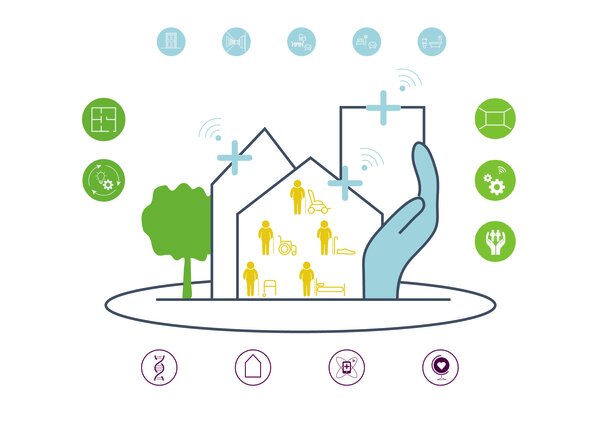The Dutch society is ageing rapidly and this results in an increase in the people suffering from dementia. The expectation is that the amount is doubled to half a million in 2040 in the Netherlands. Dementia is an umbrella term for the decline in mental capabilities which disrupt daily life. Older people in the stage of severe dementia cannot life at home and need to move into an intramural care environments.
However, many intramural care institutions do not meet the inhabitants needs. One of the reasons is the shift in healthcare concept: from a focus on care with living to a focus on living with care as a service. Compared to other seniors, seniors with dementia are even more dependent on their surroundings, since they spend most of their day inside the intramural care institution. This raises the question how an intramural care environment should be designed to meet the needs of the inhabitants: seniors with dementia.
The Regionale Stichting Zorgcentra de Kempen (RSZK Zorgprofessionals) is an innovative care organization which tries to tackle this question. They are active in the segments nursing, care and domestic care and have eight intramural care environments for 600 residents, amongst which 290 with dementia. In the plans for the future, they mention the wish to house 420 residents with dementia. This requires renovation, expansion and new development.
The goal of the research Slim wonen ontzorgt was developing design principles and conditions, together with RSZK care professionals, for a smart intramural care environment for older people with dementia. The principles and conditions aim on three areas: space, technology and the care concept, with the main focus on space and the building. For the building, the principles aim on the spaces most important for the inhabitants: the entrance and the reception, the corridor, the meeting place (living room and kitchen), the individual space and the sanitary spaces.
In the end, three guiding methods have been delivered for RSZK, which can help (re)designing their intramural care environments. One of these products is the Personakaarten (Persona cards). These cards can be used to get insight in the different inhabitants and how their capabilities and lifestyles influence the design. The Keuzehulp (Help in choices) supports when weighing possibilities to make a choice within the building. From different angles, the solutions are measured to see what is preferable in a situation. Next to those, there is the ‘RSZK Standard’.
The RSZK Standard is a handbook and offers guidance for the organization when developing smart intramural care environments for older people with dementia. It provides support in developing the program of requirements – for the space as well as the complete building, and for renovation, expansion as well as new development -, in making sustainable choices, in leads for a new care concept and the concept of smart care. The method RSZK standard can, besides developing, be used to test the present real estate of the organization to see whether they follow their vision.
RSZK Care Professionals is a progressive organisation which took on the challenge regarding the future with upcoming problems – the ageing society and the growing amount of seniors with dementia. In order to help them tackling current social challenges within their organisation, a new standard was developed, which became the RSZK Standard.
The research project ‘Smart living unburdens’ has given the organization guidance in designing uniform real estate in order to improve the quality of life for her inhabitants. This post master trajectory took place in the chair Smart Architectural Technologies under supervision of Masi Mohammadi (PI).

